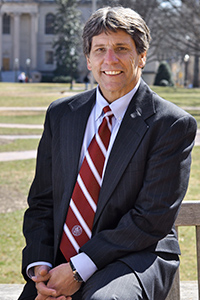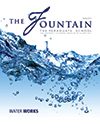Head Coach and Cheerleader
Matson Advocates for Quality in Graduate Education

Steve Matson, Graduate School Dean
“Cheerleader” is hardly the first word that comes to mind when meeting Steve Matson, Dean of the Graduate School. His tie and serious demeanor suggest an intense devotion to ideas and possibilities; it is much easier to imagine Matson focused over a microscope alongside a team of brilliant researchers in a biology laboratory than it is to imagine him waving pom-pons.
Yet “cheerleader” is one of the first words he mentions when describing his duties as the leader of graduate education at the University of North Carolina at Chapel Hill.
Matson is the face of graduate education at Carolina. “A huge part of my role is to represent the broad campus while at the same time representing individual disciplines,” he says. He is committed to listening to all 68 graduate programs and advocating for graduate education at every level. “The contribution of graduate education is incredibly positive,” he says.
Matson also ensures excellence across campus; he is as much coach as cheerleader. Soon, data from the National Research Council (NRC) will enhance Matson’s understanding and ability to coach. The NRC is near completion of a new ratings report that is the result of a massive overhaul of the old system. The NRC produces well-respected ratings of doctoral programs, but the last report came out in 1995.
The Graduate School played an essential role in collecting the data from Carolina departments for the ratings back in 2006. When the report is finally published, Matson and the rest of the Graduate School will evaluate how the University’s programs can improve. The report will be based on data that is several years old, so some things will have changed, but Matson believes that the ratings will be helpful for a lot of programs at Carolina.
“The NRC decided in 2003 to make these ratings more transparent, quantitative, and of significant value to the students looking at graduate schools and to the programs themselves,” Matson says. Previous evaluations, both from the NRC and other publications, have been helpful but ultimately superficial. These ratings involve a more complex methodology than before. Simply finding agreement on the methodology for the data analysis caused years of delays.
“We are better than the sum of our parts. I saw that as department chair, and I continue to see that as Dean of the Graduate School.”
The NRC’s goal is to make the basis for the ratings specific to the discipline, so it surveyed programs to find what each discipline values. In other words, the ratings for English, Chemistry, and Nursing are not based on the same criteria, since the programs are so different.
The result is a rich but extraordinarily complex data set. “To fully understand the statistical methodology being used pretty much requires a doctorate in statistics,” Matson says. “The methodology guide is 190 pages.”
Despite the depth of the statistics, however, some things about the excellence of Carolina’s programs are beyond the reach of quantitative data, which Matson appreciates.
“In the six years that I spent as department chair in biology, I interviewed a fair number of people for faculty positions,” Matson says. “Almost all of them talked about how they had experienced a truly unique, wonderful environment at Carolina. The first time that happens, you say, ‘Oh, that's good, I'm glad they felt that.’ But about the fortieth time that happens, you begin to recognize that it's really something—a feeling that everybody gets when they're here.” That feeling is one of many intangible qualities that statistics cannot capture.
“We are better than the sum of our parts. I saw that as department chair, and I continue to see that as Dean of the Graduate School.”
♦ Jeremy Cramer


